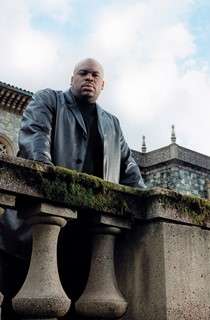|
Back
Under the Rainbow Bridge New York
David Geffen Hall, Lincoln Center
06/01/2017 - & June 3, 6*, 2017
Richard Wagner: Das Rheingold
Eric Owens (Wotan), Jamie Barton (Fricka), Christopher Purves (Alberich), Russell Thomas (Loge), Kelley O’Connor (Erda), Morris Robinson (Fasolt), Stephen Milling (Fafner), Rachel Willis-Sørensen (Freia), Brian Jagde (Froh), Christian Van Horn (Donner), Peter Bronder (Mime), Jennifer Zetlan (Woglinde), Jennifer Johnson Cano (Wellgunde), Tamara Mumford (Flosshilde)
New York Philharmonic, Alan Gilbert (conductor)
Louisa Muller (director), David C. Woolard (costume design), Dan Saunders (music preparation), Kaitlin Springston (stage manager)

M. Robinson (© Ron Cadiz)
“You don’t know what you’ve got ‘til it’s gone.”
Joni Mitchell, Big Yellow Taxi
We should mention at the outset that bon mot attributed to Sergiu Celibidache that listening to a recording is like kissing a picture of Brigitte Bardot. Similarly, opera in concert is at best a hybrid, at worst a travesty. Alan Gilbert is leaving his post as music director of the New York Philharmonic and has chosen this vehicle to say a final goodbye to a complete work, before he has his last licks in a pastiche concert next (and last) on the schedule. It seemed fitting to attend this concluding performance to properly send him off.
There are three ways to present opera in concert. One is to simply have the vocalists declare and sing, like in an oratorio or a mass. There is also the semi-acted concept wherein the characters interact and sing to each other as if they were in costume and free to move about the stage. The third and most awkward method is to combine items one and two and have some acting, some costumes, some expression of movement and some simple stand up and sing. Maestro Gilbert has chosen option 4.
Employing just the lip of the stage, the company mounted a fully acted and sung performance against all odds. Characters came and went from side entrances of the auditorium as well as the wings, the orchestra was pushed back as far as its gigantic size would allow, and the prompter had to set up shop in the front row. Costumes were mostly just dressy, although Loge’s downmarket sports jacket was too loud even for Las Vegas and seemed more appropriate for Branson, Missouri. The singers ran the gamut, with some startling surprises.
When was the last time that the Fasolt was the most impressive of the cast members? Morris Robinson was superb, in excellent voice and commandingly aggressive. Less surprising was the majesty and solemnity of Kelley O’Connor’s Erda, who is granted the show-stopping moment. Others of note were Jamie Barton as Fricka and Stephen Milling as Fafner. Finally, the best actor Oscar goes to the Mime of Peter Bronder, a put-upon victim of abuse and derision.
Less satisfying were Eric Owens as Wotan (too matter of fact), Christopher Purves as Alberich (although his portrayal of a toad was quite amusing), and Christian Van Horn as Donner, who squandered his big moment (the call to the mists) and left us cold.
Just a word about the sold-out audience. As there are no stops in the entire opera, not one nanosecond of silence, there were (blessedly) no opportunities for interfering, mood-destroying applause. However, as hour number two came and went, there were quite a few walk-outs. Since some of the characters came and went through the same doors, this presented a unique opportunity for patrons to participate in the over-arching experience.
As yes, Maestro Gilbert. The orchestra did not have one of its better nights at the opera. From the very first horn call there were fingernails on the chalkboard moments that spread to both the trumpets and the trombones, severely undercutting the terror of Alberich transforming into a reptile. Any conductor that dares to mount this opera but does not, as James Levine instructed, treat the final entrance of the gods into Valhalla not as a triumph but rather a dirge is simply missing the point. Still, a noble effort and one that, with the veil of time, will be remembered fondly. Additionally, this final “regular” concert is a brilliant foreshadowing of the beginning of next season, when the scores of “Star Wars” take the stage!
Two more items:
Memo to Maestro van Zweden: The horns still need a lot of work.
There is no ending to this review that could possibly compete with my dear friend, the late Helen Elsom, writing for ConcertoNet in 2001, who stated:
“You never felt that it would be nice to have a break. Though it seems a bit unfair of Wagner to sit everybody down for two and a half hours and then begin with the sound of running water.”
Fred Kirshnit
|